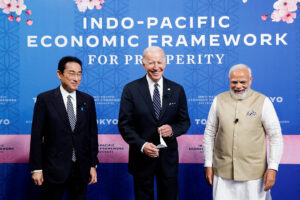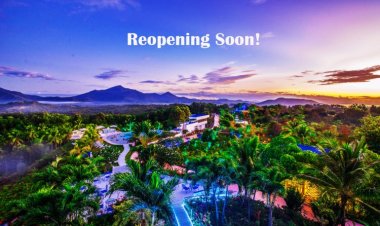IPEF expected to be up and running next year
THE PHILIPPINES expects the Indo-Pacific Economic Framework (IPEF) for Prosperity to be fully functional next year, with the trade component of the agreement to be substantially complete by the end of 2024. International Trade Group Undersecretary Allan B. Gepty told BusinessWorld that the Philippines is constantly engaging with its IPEF partners on the remaining pillar. […]

THE PHILIPPINES expects the Indo-Pacific Economic Framework (IPEF) for Prosperity to be fully functional next year, with the trade component of the agreement to be substantially complete by the end of 2024.
International Trade Group Undersecretary Allan B. Gepty told BusinessWorld that the Philippines is constantly engaging with its IPEF partners on the remaining pillar.
“The one that is pending right now and being negotiated is the first pillar, which is the trade pillar … and the target is to substantially conclude the same this year,” Mr. Gepty said in a chance interview.
In particular, he said the Philippines would like to achieve by the end of the year the outstanding issues remaining before agreement on the trade pillar.
Launched by the US with its partners in 2022, IPEF aims to advance resilience, sustainability, inclusiveness, economic growth, fairness, and competitiveness across 14 economies.
Besides the Philippines, the other partners under the Framework are Australia, Brunei, Fiji, India, Indonesia, Japan, South Korea, Malaysia, New Zealand, Singapore, Thailand, and Vietnam.
The four pillars are trade; supply chains; clean energy, decarbonization, and infrastructure; and tax and containing corruption.
The Supply Chain Agreement was signed in November 2023 and came into force in February.
“As far as the Supply Chain Agreement is concerned, they have already established the necessary bodies to ensure the effective implementation of the agreement,” he said.
These bodies are the Supply Chain Council, Crisis Response Network, and the Labor Rights Advisory Board.
“They already conducted their first meeting in July in Washington, DC and the groups that will draft action plans on critical sectors or goods have been established,” he said.
In particular, he said that there will be action plans on critical minerals, semiconductors, and batteries.
Meanwhile, three more agreements were signed by IPEF participating economies in June: the Clean Economy Agreement, the Fair Economy Agreement, and the Overarching Agreement of the IPEF.
“These three agreements are also expected to take effect this mid-October. So, that’s a positive signal to the international community that IPEF is of course functioning well,” he said.
He said that the agreement on clean economy will help generate investment in green transition project, while the Fair Economy Agreement is expected to help establish a fair and conducive business environment.
“That is the very essence of IPEF… basically, we’re united in achieving our vision of a fair, open, connected, secure, and resilient Indo-Pacific,” he said.
Mr. Gepty said that once the trade pillar is signed and ratified by each IPEF partner, the economies can expect the full implementation of the framework.
“What is good is that the Supply Chain Agreement is already effective and that the Fair Economy Agreement, Clean Economy Agreement, and the Overarching Agreement of IPEF are expected to take effect in mid-October,” he said.
“It is essentially complete, so we are just waiting on the Trade Agreement,” he added. — Justine Irish D. Tabile























